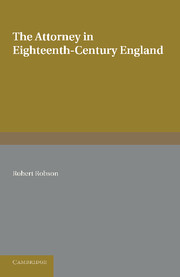Book contents
- Frontmatter
- Dedication
- Contents
- General Editor's Preface
- Preface
- Chapter I Attorneys and Solicitors Before 1700
- Chapter II Regulation of the Profession
- Chapter III The Society of Gentlemen Practisers
- Chapter IV The Provincial Law Societies
- Chapter V The Making of an Attorney
- Chapter VI The Attorney in Local Society
- Chapter VII Estates and Elections
- Chapter VIII Administration and Finance
- Chapter IX Two Attorneys
- Chapter X The Road to Respectability
- Appendix I The Apprenticeships of Richard Carre and Samuel Berridge
- Appendix II The Admission of an Attorney
- Appendix III Christopher Wallis: Notes from the Journal
- Appendix IV A Note on Numbers
- Appendix V The Professions in the Eighteenth Century: a Bibliographical Note
- List of Primary Sources
- Index
Chapter VII - Estates and Elections
Published online by Cambridge University Press: 05 June 2016
- Frontmatter
- Dedication
- Contents
- General Editor's Preface
- Preface
- Chapter I Attorneys and Solicitors Before 1700
- Chapter II Regulation of the Profession
- Chapter III The Society of Gentlemen Practisers
- Chapter IV The Provincial Law Societies
- Chapter V The Making of an Attorney
- Chapter VI The Attorney in Local Society
- Chapter VII Estates and Elections
- Chapter VIII Administration and Finance
- Chapter IX Two Attorneys
- Chapter X The Road to Respectability
- Appendix I The Apprenticeships of Richard Carre and Samuel Berridge
- Appendix II The Admission of an Attorney
- Appendix III Christopher Wallis: Notes from the Journal
- Appendix IV A Note on Numbers
- Appendix V The Professions in the Eighteenth Century: a Bibliographical Note
- List of Primary Sources
- Index
Summary
GIVING evidence before the Select Committee on Legal Education in 1846, Sir George Stephen, an attorney and solicitor, said: ‘It is quite impossible to define within a narrow compass the nature of a solicitor's business: it extends to anything, it extends to everything : law, I should say, forms about the least part of the duty of a solicitor in a large practice.’ What was true in this matter in the nineteenth century was at least equally true in the eighteenth, before the specialisation of activities which resulted in the development of many distinct professions. It was certainly true that the part of the attorney's business which involved him in court cases was a small part of his normal activities. A very much larger part of his time was spent in organisation and administration in many different capacities, and perhaps the greatest single source of business and of profit was his concern with landed property, and all the problems it involved. It was from their work in these important fields that the attorneys derived much of their profit and their prestige. In view of the paramount importance of land at the time, this is not surprising. Land was the foundation of wealth and of many social attitudes and aspirations; it was directly connected with local and political influence. The laws regulating tenures and inheritance were many and complicated, the subject of innumerable treatises and hand-books, and the source, it was alleged by landowners, of much unwarranted profit to lawyers.The buying and selling of even the smallest estate might involve complicated legal problems, prolonged investigations of the title deeds, and the drawing of long and intricate conveyancing deeds. In the case of a major estate, these problems were all multiplied, and they were exacerbated by involved settlements, trusts, and all the rights and duties inextricably linked up with landed property.
All this meant that the services of a legal expert were desirable, even in matters involving only a few acres of land; in those which involved an estate of any size and significance, they were indispensable.
- Type
- Chapter
- Information
- The Attorney in Eighteenth-Century England , pp. 84 - 103Publisher: Cambridge University PressPrint publication year: 2013



